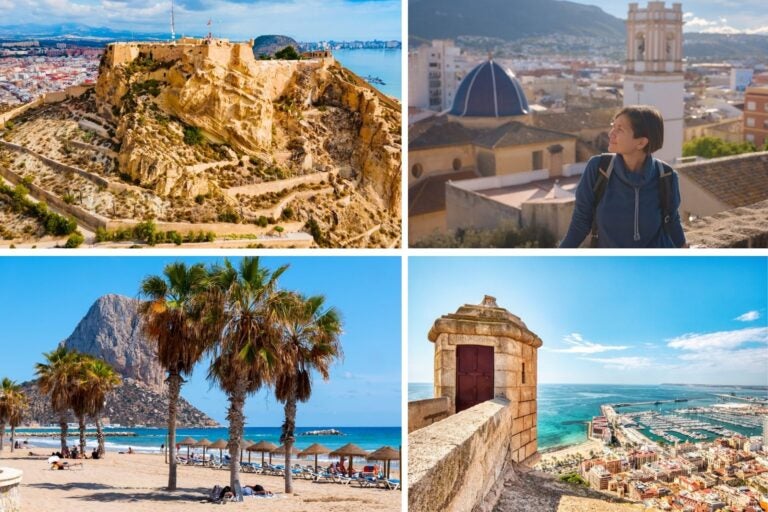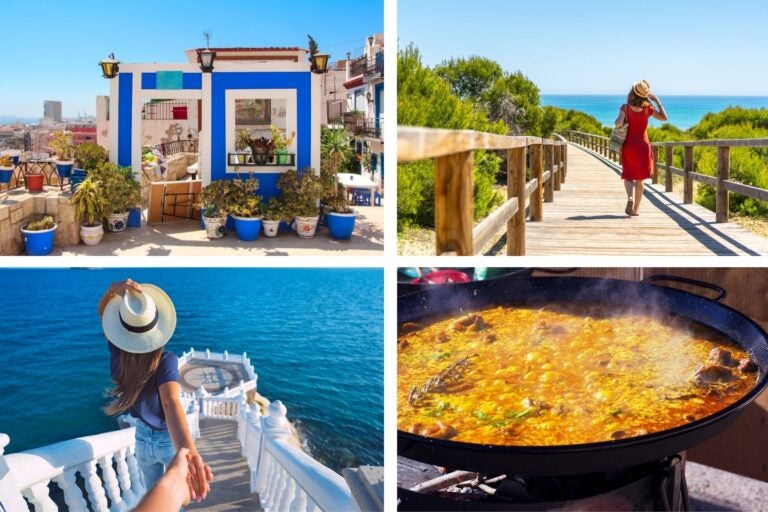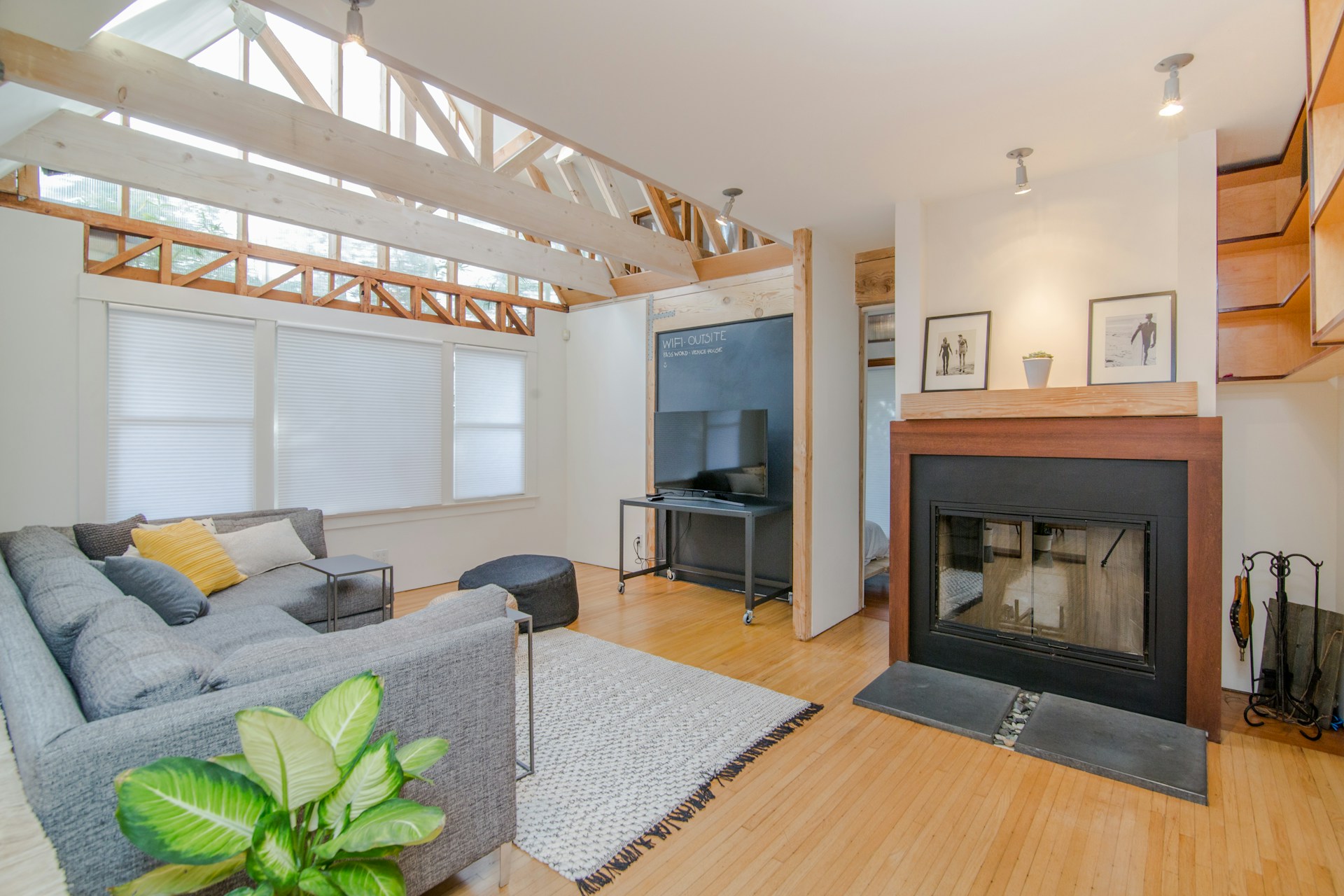Live in Alicante: Learn advantages, disadvantages & costs
Come and live in Alicante! Alicante welcomes you with open arms so you can enjoy the sun of the Costa Blanca.
Being 100% from Alicante myself, I thought I’d give you a glimpse of what it’s really like to live in Alicante as a foreigner. This beautiful city is set on Spain’s southeastern coast, right in the heart of the famous Costa Blanca.
Alicante is best known for its sunny climate with mild winters and very hot summers, its beautiful beaches, mountain hiking trails, rivers, the lively Hogueras festival, open air concerts, and plenty of nightlife and entertainment for every taste.
In this post, I’ll give you an overview of what it’s like to spend some time living in Alicante, touching on things like education, safety, cost of living, salaries, healthcare, and even how well connected the city is for remote work.
How about a trip to the place locals lovingly call the best corner of the world? Alicante is ready to make you feel at home.
Quality of life in Alicante
Did you know that during Roman times, Alicante was called Lucentum? The name comes from Latin and means ‘City of Light,’ a nod to the brightness of this land, always bathed in sunshine.
Living in Alicante means strolling down the Rambla all the way to the popular Postiguet Beach, climbing up to Santa Bárbara Castle to take in views of the Old Town and the harbor, enjoying the best paellas, and finishing the afternoon on a terrace in the Barrio or along Castaños Street. Tempting, isn’t it? Here’s a look at what life could be like in this charming city on Spain’s Valencian coast.
Education
If you’re thinking about moving to Alicante to start a study program, the Spanish government offers several scholarship opportunities you can apply for.
Alicante is known for its strong education system, both public and private. According to the QS World University Rankings, the University of Alicante consistently ranks among Spain’s top universities, and there are plenty of higher education programs taught in English, making it a great choice for international students.
Education is free up to university level, but there are scholarships that make it easy to enroll, as well as exchange agreements with universities across Europe, the Americas, and Asia. Because of this, many international students choose to complete their studies here and even start their internships in the city.
Safety
According to data from Spain’s Ministry of the Interior and a study by Numbeo on the Global Safety Index in Spanish cities, Alicante is considered a safe place to live, with crime rates lower than in many other cities in Spain and across Europe.
Most of the crimes that occur are minor thefts in tourist areas, like leaving your belongings on the beach while you go for a swim, so it’s best to avoid doing that.
The neighborhoods generally considered the safest are San Juan Playa, Albufereta, and the city center. On the other hand, areas like Juan XXIII, Las Mil Viviendas, and Colonia Requena tend to have more issues.
Cost of living
The cost of living in Alicante is about 40% lower than in other European cities like London, Paris, or Amsterdam, according to the Mercer Cost of Living 2024 report. For example, you can rent an apartment for around $798 per month in the La Florida neighborhood or about $685 in the Carolinas area.
When it comes to food, a typical meal at an average restaurant costs about $15, including starters, main courses, dessert, and a drink. If you do your grocery shopping, expect to spend around $342 per month. Here’s a quick overview of the main monthly expenses for living in Alicante:
| Concept | Monthly cost |
| 1 bedroom rental in the city center | $798 |
| 1 bedroom rental outside the city center | $685 |
| Food (monthly supermarket) | $342 |
| Eating out (daily menu) | $15 |
| Public transportation (monthly pass) | $47 |
| Gym | $40 |
| Leisure (cinema, bars, museums) | $102 |

Salaries
Salaries in Alicante tend to be lower than in other parts of Europe or major Spanish cities like Madrid or Barcelona. According to the National Statistics Institute (INE), the average monthly gross salary in the city is around $1,600.
Living costs in Alicante are reasonable, and if you earn as a digital nomad for an international company, especially with Spain’s nomad visa, you can make well above the local average. This gives you plenty of room to cover your expenses comfortably while still saving.
Healthcare system
Spain is known worldwide for having one of the best healthcare systems, according to the Global Social Progress Index (SPI). As a foreigner living in Alicante, you have access to the public healthcare system, which is free and high-quality, depending on your situation.
- Residents with residence permits: They are entitled to free public healthcare. To access it, they need to register their residence and apply for a health card at a local health center.
- Foreign students: Students from the EU can use their European Health Insurance Card (EHIC) to access public healthcare. Students from other countries need to arrange private health insurance.
- Short-stay tourists: Entitled to free emergency care.
- Digital nomads: If they contribute to the Spanish Social Security system, they automatically have access to public healthcare. If not, emergency care is still free, but they’ll need private health insurance for other types of medical services.
Although Alicante’s General Hospital provides excellent healthcare, getting an appointment with a specialist can sometimes take several months, unless it’s an emergency.
Because of this, many expats opt for private health insurance to get faster access to clinics. For example, Caser Insurance, near the city center on Calle Eusebio Sempere 1, offers a basic plan starting at about $24 per month.
Internet connection quality
Alicante is a tech-friendly city with solid infrastructure. The main telecom providers here include Movistar, Vodafone, Digi, Orange, Yoigo, and MásMóvil.
In urban areas, you can enjoy average internet speeds ranging from 300 Mbps up to 1 GB with fiber optic connections, and coverage remains good even in nearby rural areas.
If you’re staying in Alicante for a while, Holafly’s monthly plans are worth checking out. They give you unlimited data, reliable 5G, and seamless coverage. Plus, you can travel to other countries without swapping your SIM and connect two devices at once, all for about $64.90 a month.
Important: If you are a frequent traveler and want to stay connected without worrying about expensive roaming or looking for a new SIM at every destination, Holafly’s subscription plans are for you. With a single eSIM, enjoy internet in more than 170 countries for a fixed price and no surprises on your bill. Travel without limits and connect easily and securely! 🚀🌍

Advantages of living in Alicante
What more could you need to decide to live in Alicante? Whether you’re a digital nomad looking for a comfortable place to work remotely, a student wanting to combine quality education with fun, or a traveler here for leisure, this city has plenty to offer. Here are some of its main advantages:
- Pleasant climate: Enjoy more than 300 days of sunshine a year, with mild temperatures even in summer, making it perfect for outdoor activities and sports.
- Affordable cost of living: Save on accommodation and food compared to other large cities.
- Social life: Alicante is a very social city where people gather on street terraces or at the beaches, enjoying a relaxed and friendly atmosphere.
- International community: Foreign residents make up a large percentage of the population here, particularly British, French, German, and Russian nationals.
- Efficient transportation: There is a good bus, train, and tram system for visiting other cities in the region.
- Explore the city on foot: From the city center, you can walk to many key spots in about 15 minutes, including the beach, Santa Bárbara Castle, Canalejas Park, and the Old Town.

Disadvantages of living in Alicante as a foreigner
It is hard to point out many drawbacks to living in Alicante, probably because it is my hometown, but if I am being honest, these are a few of the city’s less appealing aspects:
- Extreme heat in summer: In July and August, temperatures can rise above 35 °C with humidity around 80%. If you are not used to this kind of heat, it can feel uncomfortable.
- Fewer job opportunities: Most job offers are focused on the tourism sector and the summer season.
- Language barrier: Most people in Alicante do not speak much English, especially older residents. In places like Benidorm, speaking English is not a problem, but in the city itself, knowing some Spanish is important.
- Slow bureaucracy: Some administrative procedures tend to be slow and require a lot of patience.
Frequently asked questions about living in Alicante
Renting a one-bedroom apartment in the center of Alicante costs an average of $795 per month.
You can find jobs in tourism, hospitality, retail, and language teaching, especially in the summer.
A car isn’t essential for getting around Alicante thanks to its good public transport, but it can be handy if you want to visit nearby villages, beaches, and coastal spots.
Yes, thanks to its range of co-living spaces, coworking spaces, climate, and good internet connection.
Yes, all you need is your passport or NIE and proof of your address to open an account. Many banks also offer special accounts designed for foreigners.





 Language
Language 


















 No results found
No results found








